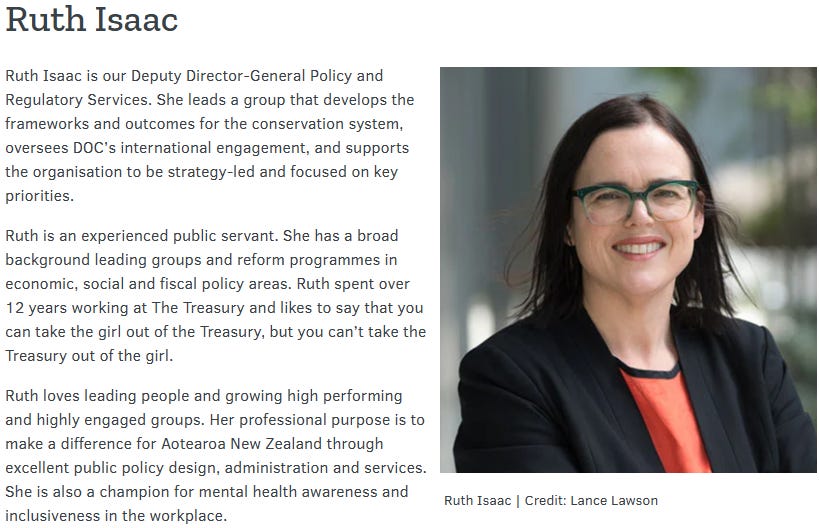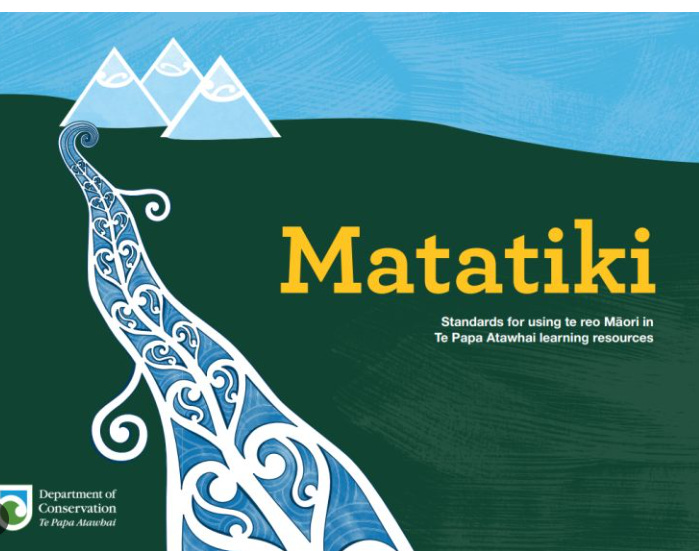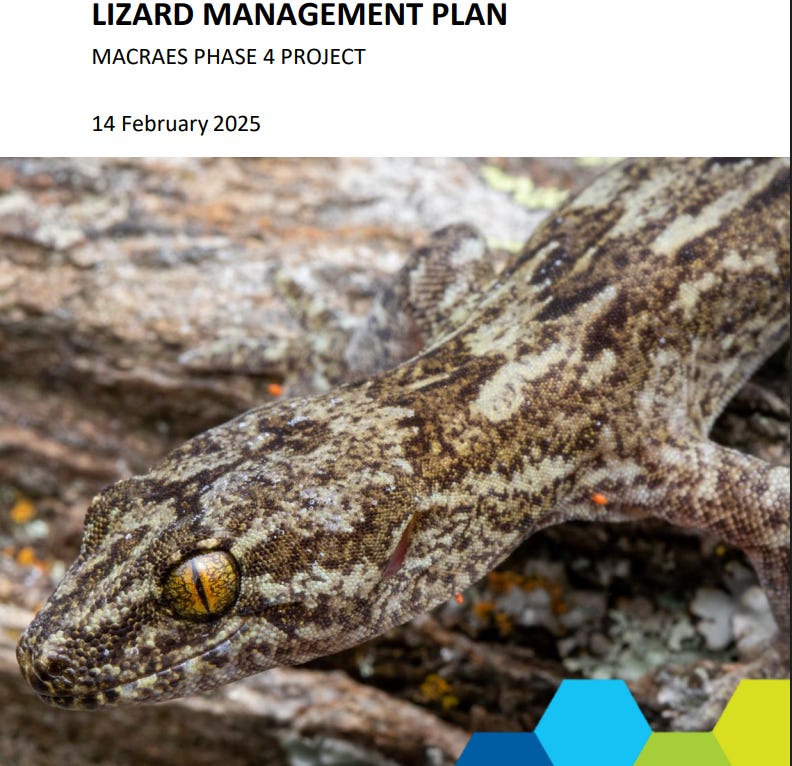NZ's Department of Conservation pleads guilty to a lesser crime
On 5 June 2025, the Department of Conservation (DoC) declined a mining company’s application for a resource consent to expand an existing gold mining operation - by a moderate 6 hectares.
The company is OceanaGold. The mine is Macraes mine near Dunedin. Macraes, which opened in 1990, is New Zealand’s largest gold mine.
DoC led the concerted opposition to the mine expansion, claiming – without a scrap of supporting evidence - that the expansion could kill 10,000 lizards. All the usual comrades joined DoC in opposing the mine’s expansion.
Priming for another customary tribal shakedown, Ngāi Tahu submitted that “the conclusions in [OceanaGold’s] application…have been reached without assessment of the cultural impacts of the project”.
Priming for another customary tribal shakedown, Ngāi Tahu submitted that “the conclusions in [OceanaGold’s] application…have been reached without assessment of the cultural impacts of the project”.
Otago Regional Council’s “senior consents planner”, Shay McDonald, recommended rejection of OceanaGold’s application, chiming in with “The proposal will also have significant adverse cumulative effects on cultural values”. Ms McDonald also expressed particular concern about the Orocrambus sophistes moth species, a single specimen of which had apparently been found in the proposed expansion area, back in 2022.
Forest & Bird joined the chorus of opposition, with F&B CEO Nicola Toki tweeting poignantly, “We are a country that loves our native wildlife and wild places.”
Forest & Bird joined the chorus of opposition, with F&B CEO Nicola Toki tweeting poignantly, “We are a country that loves our native wildlife and wild places.”

Mercifully, Resources Minister Shane Jones took up the cudgels against the ideological attempt by DoC and its fellow travelers to cancel Macraes, stating:
"We’ve got to have a showdown. Who’s running the country?...It’s either the cabinet ministers or the bureaucratic serpents. They are more of a threat than the slithering lizards.”
Without Jones entering the fray, the mine would have had to completely close within a year, with the loss of at least 700 jobs and all the associated economic and social benefits that the mine brings to the Otago region.

Click to view
Faced with a bellicose Jones, Doc deputy director-general Ruth Isaac did a complete DoC about-face, rabbiting on as follows:
"We’ve received feedback that when we asked for more information from [OceanaGold] about their lizard management plan, there was a miscommunication, and we weren’t clear enough about what we were looking for and moved to decline the application too quickly without clarifying with [OceanaGold]. We acknowledge our process wasn’t as customer focused as it could have been and we will work closely with [OceanaGold] to progress their application swiftly and pragmatically, alongside the other applications in our system.”
Let’s examine greasy Ruth’s Doublespeak. First, there was no “miscommunication” here. DoC unlawfully declined OceanaGold’s resource consent application. In DoC, New Zealand suffers a government department that – in exercise of the personal whims and ideologies of its unaccountable senior staff - repeatedly fails to impartially apply the law of this land, in defiance of an elected Government.
And DoC is no outlier here. New Zealanders are suffering a public service that is predominantly in blatant, petulant, damaging revolt against the current Government and New Zealand citizens’ overall best interests.
With sneering insincerity and corporate speak, Ruth purports to “acknowledge our process wasn’t as customer focused as it could have been”. Here’s a transparent truth, Ruth. OceanaGold isn’t DoC’s “customer”. DoC’s not selling OceanaGold anything. OceanaGold is a credible, socially responsible mining company with a legitimate expectation that DoC and the rest of New Zealand’s public service will professionally and impartially discharge their statutory functions.
DoC’s tactics are straight from the Playbook - overused word…but hey – of our intransigent public “service”. The underhand Mandarin strategy is to operate unlawfully in pursuit of ideological goals and, when caught out, brush the mischief under the carpet as just innocent mistakes. But then keep coming at us, again, and again, and again. Because WokeLeopards don’t change their spots.
Please Shoot the Sherriff and the Deputy*
DoC Deputy Ruth Isaac should be fired* for her role in DoC’s failed attempt to shut down Macraes mine, and her snide denials.
But DoC Director General Penny Nelson should also be put up against the wall*. It is inconceivable that DoC can be pursuing its errant ideological pursuits without the Director General’s personal endorsement.
(*I’m of course not advocating for anyone to be literally shot)
Penny’s partisanship includes turning DoC into a radically raceified State department.
The Conservation Act provides that “This Act shall so be interpreted and administered as to give effect to the principles of the Treaty of Waitangi.” Ms Nelson has interpreted this provision as requiring DoC to do nothing without deferring to people with Maori ancestry.

DoC’s website includes the following ramblings of Race Religiosity:
Partnership – mutual good faith and reasonableness
The Crown and Māori must act towards each other reasonably and in good faith. These mutual duties of reasonableness and good faith describe the nature of the relationship between the Crown and Māori. They are the core of what has been described as the Treaty partnership. This principle is about how the Crown should behave to Māori and Māori to the Crown.
Informed decision-making
Both the Crown and Māori need to be well informed of the other’s interests and views. When exercising the right to govern, Crown decision makers need to be fully informed. For Māori, full information needs to be provided in order to contribute to the decision-making process. This is connected closely to the principles of good faith and active protection. Consultation is a means to achieve informed decision-making.
Active protection
The Crown must actively protect Māori interests retained under the Treaty as part of the promises made in the Treaty for the right to govern. This includes the promise to protect tino rangatiratanga and taonga. Active protection requires informed decision-making and judgement as to what is reasonable in the circumstances.
Redress and reconciliation
The Treaty relationship should include processes to address differences of view between the Crown and Māori. The Crown must preserve capacity to provide redress for proven grievances from not upholding the promises made in the Treaty. Māori and the Crown should demonstrate reconciliation as grievances are addressed.
Less-than-Admirable Nelson has:
- established shared decision-making (Maorified) DoC boards
- recognised mātauranga Māori (Māori metaphysical “knowledge” systems) in DoC strategies
- expressed DoC support for the Waitangi Tribunal’s Wai 262 report (that’s the Tribunal’s report recommending that people with Māori ancestry own the exploitable intellectual property rights in all New Zealand’s species of plants and animals, and that Māori culture be made central to a State-mandated New Zealand “identity”)
- prescribed DoC acknowledgement of Māori tino rangatiratanga (authority) over taonga species and landscapes
- ensured DoC does its upmost to give elite Māori people authority over how native species and landscapes are protected and used
But DoC’s objection to any mining is naked extremism. And deferring to the imaginary Māori Monolith in all DoC’s activities is crazy. The following nonsense, from DoC’s website, is the last thing New Zealanders or native lizards really need:
Ngārara [lizards] are valued as a source of energy, life and mauri that has sustained the people and the land of Te Ātiawa ki Whakarongotai [Kapiti Coast]. They are respected because of their whakapapa; their genealogical and ecological relationships with the environment and people. They are of ancient origin and we consider them our tuakana, or elder siblings.
Ngārara are sensitive to changes in systems and are recognised as important tohu or indicator species. They are considered tapu, as they are also recognised as a social mechanism of restriction in that they indicate a need for caution, or convey messages of warning. Ngārara are the spiritual kaitiaki, or caretakers, or the people, the water and the land.
There is a Māori belief held that Tū-tangata-kino (a spiritual reptile) “guarded the house of Miru, ruler of the underworld”.
For Māori, whilst lizards could be feared and seen as a bad omen – representing Whiro (darkness and death), they are often used as guardians, and released near the burial sites of loved ones, and used as a talisman and kaitiaki, as a means to offer protection for important whare / buildings. The placement of the lizard would inspire fear for prospective trespassers, and show that the protection of the atua (gods) has been placed on the tapu place
Addressing New Zealand’s problems with pestilence and invasive species is very expensive. Without a productive economy that includes royalty and tax-generating mining, the ecological war will be lost.
The main threat to lizards is not habitat loss. It’s getting eaten by introduced predators (rats, mice, cats, mustelids, hedgehogs etc.). Resource consents for mining can and should be conditional on the applicant mining company eliminating predator pests and creating secure predator-free environments.

I’ve been fortunate to work with grounded DoC staff in secretly relocating Wellington green geckos to predator-free islands. The non-DoC lizard expert and breeder we worked with pointed out that fenced-off mining tailings can provide excellent habitats for lizards such as the endangered Otago skink. The expert laments DoC Clergy spurning opportunities to create such habitats. Get OceanaGold to put predator-proof fences around its mining tailings and we’ve got ourselves perfect pest-free lizard paradises.
Now that OceanaGold’s 6 hectare Macraes expansion will go ahead, OceanaGold will be able to implement its elaborate (82 page) plan to relocate lizards from the expansion area. Won’t that be nice?

John McLean is a citizen typist and enthusiastic amateur who blogs at John's Substack where this article was sourced.



12 comments:
The anti-mining policies, whether they are against gold mining, coal mining or mining other minerals is the ultimate example of economic policy according to emotion. A well managed mine in a place not environmentally sensitive, which is restored afterwards, is far less destructive than most other land uses such as tourism. However, to Helen Clark, Jacinda, their appointees in DOC, and the msm, all mining is inherently evil. And to Ngai Tahu, everything is culturally inappropriate unless they're getting a cut, like governors in a military ductatorship. It is far better, for instance, to shut coal mines, heartlessly putting whole communities (like Ohai) out of work, when you can just import coal from Indonesia which is more environmentally damaging.
Once all the DoC land is handed back to Ngai Tahu, how long before they uncover some forgotten tikanga that reminds them that mining is good. Then they will clear the South Island for a second time.
NZ bureaucracy needs a big clean out. We need an attitude of "let's see how we can make this work" and not the "lets make this as difficult as possible". These business entities provide well paid and needed jobs
If there are 10,000 lizards on a 6 hectare site they can't be very endangered. DOC have become a very dangerous, ideologically driven threat to our country. There needs to be a total clean out. I have seen over the years on the West Coast where ideologically driven staff members have pursued their own agendas.
The 'no mining' folk are all for the mining for their electric cars etc.....
Un bloody believable. Is this the same Ngai Tahu mob that bitched about dredging Lyttelton Harbour citing cultural impacts but never hesitated to carve a channel through fragile reefs to enable the continuance of their tax free whale watching enterprise in Kaikōura after the earthquake. The sooner NZ realises it would be a more prosperous place without the blood sucking Regional Councils, never ending Maori grievance and the excesses of DoC over reach, the better.
On this cold frosty morning I'm going to do hard physical work to pay taxes to fund these flunkies to sit in their warm offices writing this drivel, then form a committee to sit around with their Chinese greenstone on a bir of flax.
Having karakia-ed and spoken in some recently created language, they are going to agree that this construction of random fabricated words makes sense, and in the interests of all NZers that these policies should be implemented ?
Doc through Eugreeny Sage put a marine mammal sanctuary to protect Maui Dolphin in an area they don’t inhabit, but mining is proposed.
I can only hope a day of savage reckoning is coming for DOC wokies. Them against the wall is not a bad idea.
This clarifies that the rant about Regional Councils is misplaced.
It is the indoctrinated staff that have taken over and the fundamental role remains important .
Every last one of them is a hypocrite.
Every day DoC people use resources that came out of the ground, but they are very selective about their objections.
Look around you, absolutely everything you can see came out of the ground at some time - everything, can you think of any exceptions ?
Even the chunk of greenstone dangling from their neck was mined in China , shaped by cheap labour and exported on a fossil fuel burning steel ship, trucked to a store which they drove to in either their own EV , or one of the many 3 litre diesel DoC utes.
Gold wedding rings ?
Are all DoC staff so indoctrinated that they must comply with their management doctrine?
Wakey, wakey - push back.
Ngai Tahu submitted that “the conclusions in [OceanaGold’s] application…have been reached without assessment of the cultural impacts of the project”
Might the cultural impact have been that NT would not gain a share of the proceeds?
I am surprised that NT did not claim total ownership of all South Island gold. In the same way, as they had written into their Treaty settlement, that NT was granted total ownership of all South Island greenstone. We call it ownership. NT describes it as guardianship.
NT’s greenstone appropriation/capture/takeover did have a cultural impact on me. Way back when, I took a mental note not to ever buy any South Island greenstone items.
About 10,000 lizards and 6 hectares – that is 6 square metres per lizard.
Post a Comment
Thank you for joining the discussion. Breaking Views welcomes respectful contributions that enrich the debate. Please ensure your comments are not defamatory, derogatory or disruptive. We appreciate your cooperation.